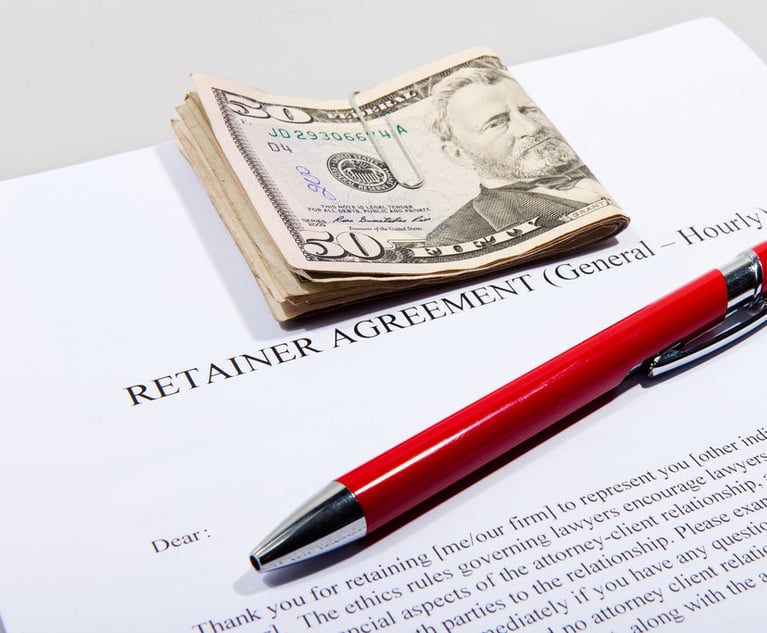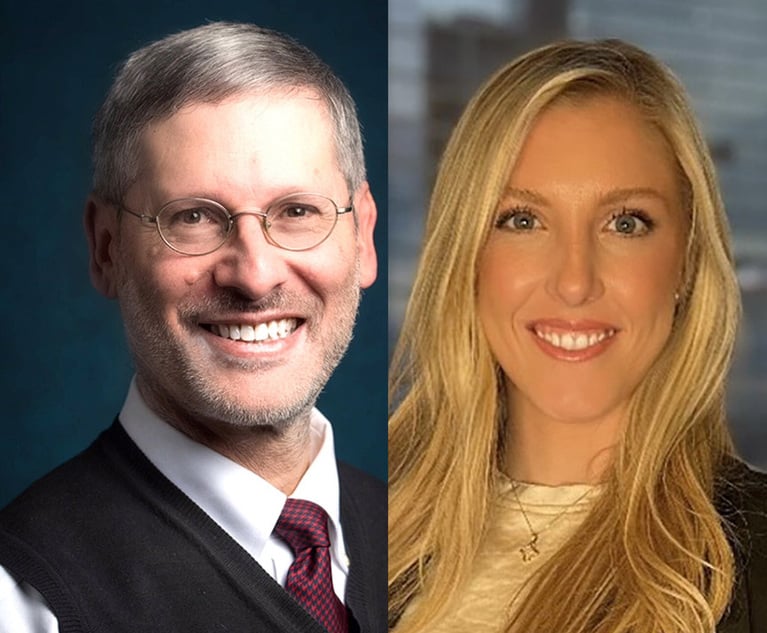 Vice Chancellor Sam Glasscock III of Delaware Chancery Court.
Vice Chancellor Sam Glasscock III of Delaware Chancery Court.NY Business Partners' Contract Dispute Fueled by 2016 Election Quelled in Del. Court
More than two years after feelings over the 2016 presidential election caused a rift between a trio of business partners, a jurist from Delaware rejected an attempt to kick one of those men out of the arrangement.
March 22, 2019 at 01:53 PM
4 minute read
More than two years after feelings over the 2016 presidential election caused a rift among three business partners, a Delaware Chancery Court judge rejected an attempt to kick one of those men out of the arrangement.
Vice Chancellor Sam Glasscock III of the Delaware Court of Chancery denied an attempt by two of the men to give them power to sever ties with Erwin Gonzalez, who was represented in the case by Michael Bowe, a partner at Kasowitz Benson Torres in New York.
The two other men, Adam Goldenberg and Abraham Eisenstat, had asked Glasscock to reform a set of joint venture agreements between the three men to give Goldenberg unilateral power to oust a member. Goldenberg had claimed that they had intended, when amending those agreements, to give him that power.
But Glasscock sided with Gonzalez, who had claimed that Goldenberg and Eisenstat were simply unaware that the decision to oust a member had to be unanimous, per the contract. The joint venture agreements they signed on to specifically said one member could not make such a decision unilaterally, Glasscock said in the decision.
“The evidence at trial shows that [Goldenberg and Eisenstat] did not read the Old Oakland JVA or either of the two subsequent JVAs that gave the parties equal decision-making authority,” Glasscock wrote. “Nevertheless, failure to read does not per se indicate that there was no mistake, or that reformation is unavailable. For purposes of this analysis, I assume that [Goldenberg and Eisenstat] were mistaken.”
The amended joint venture agreements stem from a draft that was emailed to all three men in 2015 from an associate at Schulte Roth & Zabel, which they retained when starting their second joint venture. The draft was supposed to be based on a previous agreement that did not require unanimity on major decisions. Instead, it was based on a different agreement that did, in fact, require unanimity.
Goldenberg and Eisenstat signed the agreement thinking that major decisions could be made unilaterally, according to Glasscock. But the agreement did not reflect that.
More than a year later, that agreement would become particularly important when the relationship between Goldenberg and Gonzalez came to a boil. The day after the 2016 election, Goldenberg confronted Gonzalez about the outcome of the presidential contest.
Goldenberg specifically asked Gonzalez if he had voted for Donald Trump for president. Gonzalez confirmed that he had voted for Trump, after which a verbal altercation ensued. Goldenberg made clear to Eisenstat after that day that he no longer wanted to be in business with Gonzalez.
Goldenberg later asked Gonzalez to sign an agreement that would reduce his authority in the joint venture. Gonzalez declined to do so.
Glasscock wrote in his decision that just because Goldenberg and Eisenstat didn't realize they needed unanimous consent to part ways with Gonzalez, that doesn't change what they technically agreed to in the contract.
“Even assuming, as I do, that the majority members were mistaken regarding the terms of the three JVAs prepared by Schulte, I find that the majority members have not met their burden of demonstrating that Gonzalez was mutually mistaken, or that he knew of the majority members' mistake and remained silent,” Glasscock wrote.
Goldenberg and Eisenstat were represented by Stan Chelney and Philipp Smaylovsky from the Chelney Law Group in Manhattan, who did not immediately respond to a request for comment.
READ MORE:
This content has been archived. It is available through our partners, LexisNexis® and Bloomberg Law.
To view this content, please continue to their sites.
Not a Lexis Subscriber?
Subscribe Now
Not a Bloomberg Law Subscriber?
Subscribe Now
NOT FOR REPRINT
© 2024 ALM Global, LLC, All Rights Reserved. Request academic re-use from www.copyright.com. All other uses, submit a request to [email protected]. For more information visit Asset & Logo Licensing.
You Might Like
View All
Ben & Jerry’s Accuses Corporate Parent of ‘Silencing’ Support for Palestinian Rights
3 minute read


Trending Stories
- 1Prior Inconsistent Statements and Medical Malpractice Defense
- 2Public Interest Calendar of Events
- 3Why Law Firms Should Focus on IA for Improved Gen AI
- 4Post-Pandemic Increase in Live Events Prompts Need for Premise Liability Action
- 5Companies' Dirty Little Secret: Those Privacy Opt-Out Requests Usually Aren't Honored
Who Got The Work
Michael G. Bongiorno, Andrew Scott Dulberg and Elizabeth E. Driscoll from Wilmer Cutler Pickering Hale and Dorr have stepped in to represent Symbotic Inc., an A.I.-enabled technology platform that focuses on increasing supply chain efficiency, and other defendants in a pending shareholder derivative lawsuit. The case, filed Oct. 2 in Massachusetts District Court by the Brown Law Firm on behalf of Stephen Austen, accuses certain officers and directors of misleading investors in regard to Symbotic's potential for margin growth by failing to disclose that the company was not equipped to timely deploy its systems or manage expenses through project delays. The case, assigned to U.S. District Judge Nathaniel M. Gorton, is 1:24-cv-12522, Austen v. Cohen et al.
Who Got The Work
Edmund Polubinski and Marie Killmond of Davis Polk & Wardwell have entered appearances for data platform software development company MongoDB and other defendants in a pending shareholder derivative lawsuit. The action, filed Oct. 7 in New York Southern District Court by the Brown Law Firm, accuses the company's directors and/or officers of falsely expressing confidence in the company’s restructuring of its sales incentive plan and downplaying the severity of decreases in its upfront commitments. The case is 1:24-cv-07594, Roy v. Ittycheria et al.
Who Got The Work
Amy O. Bruchs and Kurt F. Ellison of Michael Best & Friedrich have entered appearances for Epic Systems Corp. in a pending employment discrimination lawsuit. The suit was filed Sept. 7 in Wisconsin Western District Court by Levine Eisberner LLC and Siri & Glimstad on behalf of a project manager who claims that he was wrongfully terminated after applying for a religious exemption to the defendant's COVID-19 vaccine mandate. The case, assigned to U.S. Magistrate Judge Anita Marie Boor, is 3:24-cv-00630, Secker, Nathan v. Epic Systems Corporation.
Who Got The Work
David X. Sullivan, Thomas J. Finn and Gregory A. Hall from McCarter & English have entered appearances for Sunrun Installation Services in a pending civil rights lawsuit. The complaint was filed Sept. 4 in Connecticut District Court by attorney Robert M. Berke on behalf of former employee George Edward Steins, who was arrested and charged with employing an unregistered home improvement salesperson. The complaint alleges that had Sunrun informed the Connecticut Department of Consumer Protection that the plaintiff's employment had ended in 2017 and that he no longer held Sunrun's home improvement contractor license, he would not have been hit with charges, which were dismissed in May 2024. The case, assigned to U.S. District Judge Jeffrey A. Meyer, is 3:24-cv-01423, Steins v. Sunrun, Inc. et al.
Who Got The Work
Greenberg Traurig shareholder Joshua L. Raskin has entered an appearance for boohoo.com UK Ltd. in a pending patent infringement lawsuit. The suit, filed Sept. 3 in Texas Eastern District Court by Rozier Hardt McDonough on behalf of Alto Dynamics, asserts five patents related to an online shopping platform. The case, assigned to U.S. District Judge Rodney Gilstrap, is 2:24-cv-00719, Alto Dynamics, LLC v. boohoo.com UK Limited.
Featured Firms
Law Offices of Gary Martin Hays & Associates, P.C.
(470) 294-1674
Law Offices of Mark E. Salomone
(857) 444-6468
Smith & Hassler
(713) 739-1250






